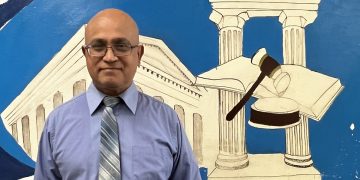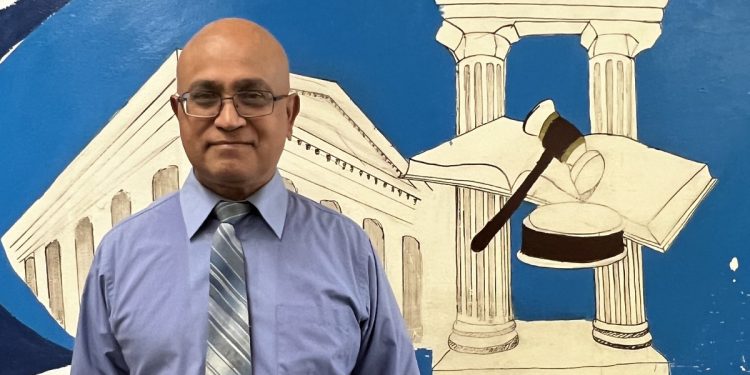An analysis of Jagan and the cold war is as relevant today as it was in that period (1946-91). It is not correct for anyone to pen “it belongs to a bygone era” and ignored his history of communism while excoriating those of us who write on it or on other historical issues. Historians and even social scientists don’t operate or analyze events that way. They don’t ignore or forget history. History is dynamic; it does not stop, and events tend to re-occur. That is why the late Prof George Santayana warned that those who ignore or fail to learn from history are doomed to repeat it (meaning events). Jagan did not learn from 1953 and his fate was repeated in 1964. The PPP did not learn from that period and its fate was repeated in 2015. The PPP adapted nicely in being pro-America as advised after the defeat in 2015 and was rewarded in 2020.
History and the cold war is as apt today as between 1946 and 1991. There is a new kind of cold war between America and the West and two major eastern powers (with their allies) that have challenged the USA globally including in its critical backward. The consequences could be devastating if countries in the American backyard defy the Monroe Doctrine and again take an anti-American position. It is noted that President Irfaan Ali and Vice President Jagdeo have been appealing to USA for assistance against claims by Venezuela’s to two thirds of our territory. It is the right approach. Venezuela is supported by the eastern powers and Iran, another nemesis of America. Mr. Clement Rohee and other communists have also appealed for US intervention on Guyana side. So much for attacking the ‘parasitic imperialists’ during the cold war.
Contrary to what may be penned in rebuttal on comments and or the Seecharan book pertaining to Dr Jagan and the cold war, the fact remains he (his party as well as his Indian base) was kept out of power (from December 1964 to October 1992) because of his communist philosophy. The fact that Jagan remained a communist from his introduction to it in America in the late 1930s to 1991 and did not betray his belief of his communist comrades, is not something to celebrate. It was not a badge of honor to his supporters. The latter suffered 28 years (1964 to 1992) of misrule and persecution. There was unspeakable atrocities, bitterness, and material and human destruction as well as killing of opponents all attributed to Burnham’s misrule. That period was preceded by destabilization of the PPP government That Indians supported between 1957 and 1964. While true that Indians bore the suffering and remained loyal to communist Jagan, they did so not because of his communism but out of racial solidarity. They did not vote to build communism or a communist state. They did not understand the pitfalls of communism and the serious consequences they would face from the Americans and the western powers. The choice was an African PNC or an Indian PPP. It was inevitable people would line up behind the party (and de facto leader) of their race. It was a paradox (a contradiction) for capitalistic Indians to vote for communistic Jagan and PPP as my Prof Gregory Massell noted in a course on Communism and Anarchism.
I too supported Jagan from a little boy growing up in Port Mourant a few streets from the home he was born. I went to every event pertaining to Jagan or the PPP. I ran behind Jagan’s car (believe it was a Soviet Lada) and assisted with running errands and packing benches and chairs. I helped sold Mirror newspapers. I got voters out in 1968 and 1973 elections which were of no avail as both were rigged; western powers close their eyes to rigging because of their opposition to the return of communist Jagan. As a Jaganite, I pioneered a struggle for free and fair elections while a student in America (1977-92). When I was championing FFE and lobbying the Americans, Rohee and other communists were in Czechoslovakia and the Soviet bloc. We bore the brunt of the suffering in Guyana and carrying out the struggle to liberate it from communism.
As academics and activists, we were not enemies of Jagan but of communism. In 2018 at Jagan’s birth centennial, I approached organizations in Delhi to hold a conference or seminar on Jagan. I referred to Jagan as the Gandhi of the Caribbean in my requests for sponsorship of a conference. A letter to the Indian Council of History to sponsor a seminar on Jagan received no written response. I a trip to Delhi, I personally met the Chairman and made the case for a seminar on Jagan. His response was: “Your hero was an honorable, honest but naive gentleman. He caused the sufferings of his people. I am aware of your contributions to India-Guyana relations and your activities in the diaspora. I salute your work. But sorry I can’t support your request for funding for a seminar or conference on Dr. Jagan”. What struck me was how well the elderly gentleman knew of Jagan and his recognition of the mistake he made in embracing communism. In 1985 in Delhi as a visiting scholar, I met MPs and university intellectuals all who told me Jagan was a naive politician who challenged America in her backyard. The result was inevitable — keeping him out of office.
I should note that while others got scholarships to study in the Soviet bloc because of loyalty to the party, people like me could not pay to attend universities in those countries. The parents of people like me and we ourselves had to work very hard on the land and sell produce, save every penny in order to fund our studies in capitalistic countries and India. And over a million Guyanese left the homeland for the western bourgeois countries, not to communist Cuba, China, or the Soviet bloc.
Analysts like me saw the need to reject communism in order to win over Americans for democracy to be restored to the homeland.
Jagan was not a pragmatist. Many world leaders talked socialism but recognized its limitations in getting into office. And even those who talked socialism, like Lee Kwan Yew, once in office, they abandoned it. Burnham stayed away from socialism and accused Jagan of being a communist who posed a threat to Western interests. The West embraced Burnham. Once in office and he consolidated his reins on power through the establishment of a dictatorship, he embraced socialism (communism, some argued it was fascism). He suffered the consequences with a bankrupt economy.
In commenting on the pitfalls of Jagan’s communism, neither me nor others disrespected the iconic Jagan. We were not his enemies as explained above. Communism was his enemy to return to office as well as the enemy of Indian Guyanese. He was a charismatic, honest politician. He was and still remains our hero. That does not mean we should not have a critical perspective on the old man. He erred in embracing communism that led to the challenges Guyanese were forced to endure between 1953 and 1992.
Yours truly,
Dr Vishnu Bisram


































































